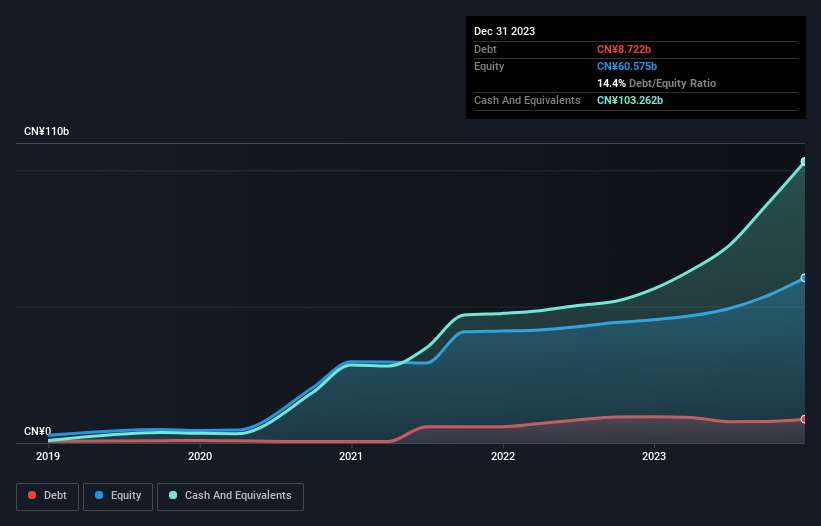Li Auto (NASDAQ:LI) Could Easily Take On More Debt
Some say volatility, rather than debt, is the best way to think about risk as an investor, but Warren Buffett famously said that 'Volatility is far from synonymous with risk.' It's only natural to consider a company's balance sheet when you examine how risky it is, since debt is often involved when a business collapses. We note that Li Auto Inc. (NASDAQ:LI) does have debt on its balance sheet. But should shareholders be worried about its use of debt?
When Is Debt A Problem?
Debt and other liabilities become risky for a business when it cannot easily fulfill those obligations, either with free cash flow or by raising capital at an attractive price. In the worst case scenario, a company can go bankrupt if it cannot pay its creditors. While that is not too common, we often do see indebted companies permanently diluting shareholders because lenders force them to raise capital at a distressed price. Of course, the upside of debt is that it often represents cheap capital, especially when it replaces dilution in a company with the ability to reinvest at high rates of return. When we think about a company's use of debt, we first look at cash and debt together.
View our latest analysis for Li Auto
What Is Li Auto's Net Debt?
You can click the graphic below for the historical numbers, but it shows that Li Auto had CN¥8.72b of debt in December 2023, down from CN¥9.62b, one year before. However, its balance sheet shows it holds CN¥103.3b in cash, so it actually has CN¥94.5b net cash.
How Healthy Is Li Auto's Balance Sheet?
According to the last reported balance sheet, Li Auto had liabilities of CN¥72.7b due within 12 months, and liabilities of CN¥10.1b due beyond 12 months. Offsetting this, it had CN¥103.3b in cash and CN¥143.5m in receivables that were due within 12 months. So it actually has CN¥20.5b more liquid assets than total liabilities.
This short term liquidity is a sign that Li Auto could probably pay off its debt with ease, as its balance sheet is far from stretched. Simply put, the fact that Li Auto has more cash than debt is arguably a good indication that it can manage its debt safely.
It was also good to see that despite losing money on the EBIT line last year, Li Auto turned things around in the last 12 months, delivering and EBIT of CN¥7.4b. There's no doubt that we learn most about debt from the balance sheet. But it is future earnings, more than anything, that will determine Li Auto's ability to maintain a healthy balance sheet going forward. So if you're focused on the future you can check out this free report showing analyst profit forecasts.
Finally, a business needs free cash flow to pay off debt; accounting profits just don't cut it. While Li Auto has net cash on its balance sheet, it's still worth taking a look at its ability to convert earnings before interest and tax (EBIT) to free cash flow, to help us understand how quickly it is building (or eroding) that cash balance. Over the last year, Li Auto actually produced more free cash flow than EBIT. That sort of strong cash generation warms our hearts like a puppy in a bumblebee suit.
Summing Up
While it is always sensible to investigate a company's debt, in this case Li Auto has CN¥94.5b in net cash and a decent-looking balance sheet. And it impressed us with free cash flow of CN¥51b, being 684% of its EBIT. So is Li Auto's debt a risk? It doesn't seem so to us. The balance sheet is clearly the area to focus on when you are analysing debt. But ultimately, every company can contain risks that exist outside of the balance sheet. Case in point: We've spotted 2 warning signs for Li Auto you should be aware of.
At the end of the day, it's often better to focus on companies that are free from net debt. You can access our special list of such companies (all with a track record of profit growth). It's free.
Have feedback on this article? Concerned about the content? Get in touch with us directly. Alternatively, email editorial-team (at) simplywallst.com.
This article by Simply Wall St is general in nature. We provide commentary based on historical data and analyst forecasts only using an unbiased methodology and our articles are not intended to be financial advice. It does not constitute a recommendation to buy or sell any stock, and does not take account of your objectives, or your financial situation. We aim to bring you long-term focused analysis driven by fundamental data. Note that our analysis may not factor in the latest price-sensitive company announcements or qualitative material. Simply Wall St has no position in any stocks mentioned.

